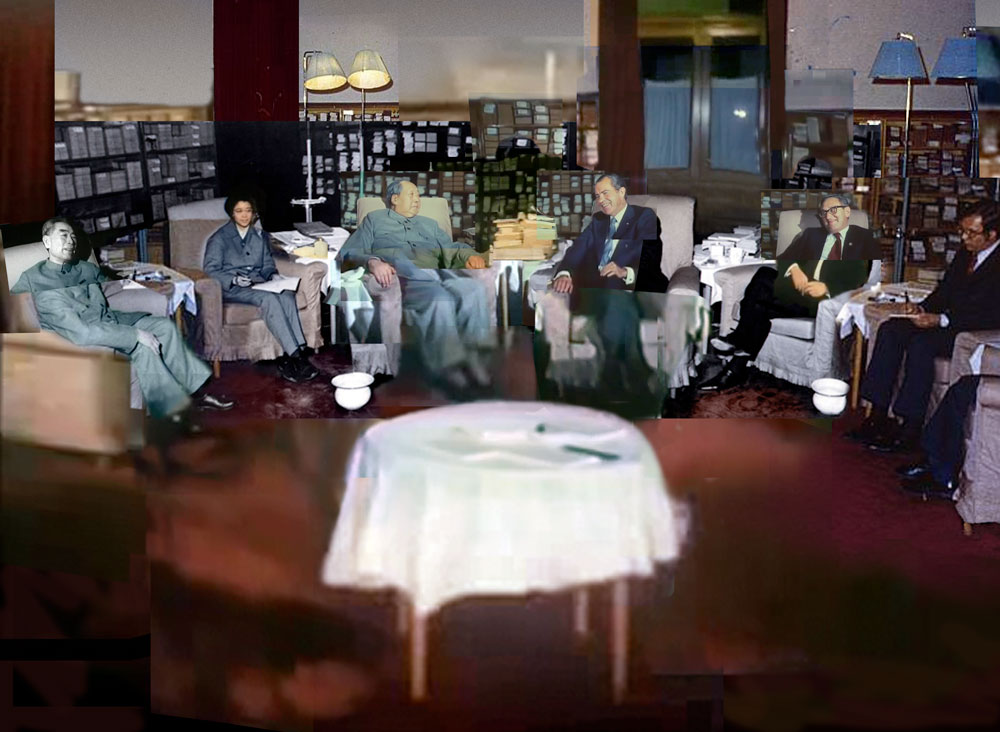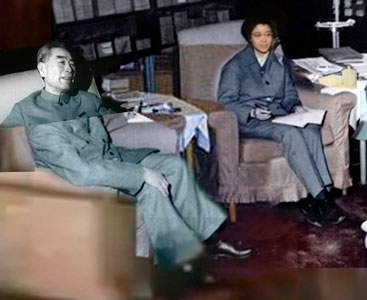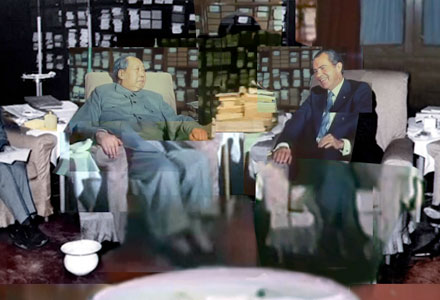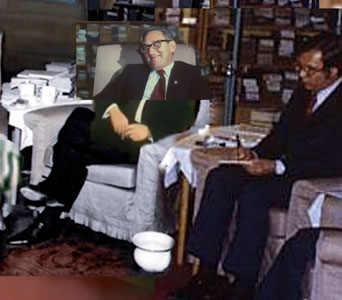Mao Zedong Meets Richard Nixon
2017
17.5" x 13”
Archival print


Prime Minister Chou En-lai and Tang Wen-sheng, the Interpreter

Mao Zedong and Richard Nixon philosophize.

Henry A. Kissinger, Assistant to the President for National Security Affairs and Winston Lord, National Security Council Staff (Notetaker). The U.S. had requested that all photographs and communiqués "cut out" Lord, to avoid the embarrassment of not having Secretary of State, William Rogers, at the historic meetings.
February 21, 1972
MEMORANDUM OF CONVERSATION
PARTICIPANTS: Chairman Mao Tsetung Prime Minister Chou En-lai Wang Hai-jung, Deputy Chief of Protocol of the Foreign Ministry Tang Wen-sheng, Interpreter President Nixon Henry A. Kissinger, Assistant to the President for National Security Affairs Winston Lord, National Security Council Staff (Notetaker)
DATE AND TIME: Monday, February 21, 1972- 2:50-3:55 p.m.
PLACE: Chairman Mao’s Residence, Peking
(There were opening greetings during which the Chairman welcomed President Nixon, and the President expressed his great pleasure at meeting the Chairman.)
President Nixon: You read a great deal. The Prime Minister said that you read more than he does.
Chairman Mao: Yesterday in the airplane you put forward a very difficult problem for us. You said that what it is required to talk about are philosophic problems.
President Nixon: I said that because I have read the Chairman’s poems and speeches, and I know he was a professional philosopher. (Chinese laugh.)
Chairman Mao: (looking at Dr. Kissinger) He is a doctor of philosophy?
President Nixon: He is a doctor of brains.
Chairman Mao: What about asking him to be the main speaker today?
President Nixon: He is an expert in philosophy.
Dr. Kissinger: I used to assign the Chairman’s collective writings to my classes at Harvard.
Chairman Mao: Those writings of mine aren’t anything. There is nothing instructive in what I wrote. (Looking toward the photographers) Now they are trying to interrupt our meeting, our order here.
President Nixon: The Chairman’s writings moved a nation and have changed the world.
Chairman Mao: I haven’t been able to change it. I’ve only been able to change a few places in the vicinity of Peking. Our common old friend, Generalissimo Chiang Kai-shek, doesn’t approve of this. He calls us communist bandits. He recently issued a speech. Have you seen it?
President Nixon: Chiang Kai-shek calls the Chairman a bandit. What does the Chairman call Chiang Kai-shek?
Prime Minister Chou: Generally speaking we call them Chiang Kai-shek’s clique. In the newspapers sometimes we call him a bandit; we are also called bandits in turn. Anyway, we abuse each other.
Chairman Mao: Actually, the history of our friendship with him is much longer than the history of your friendship with him.
President Nixon: Yes, I know.
Chairman Mao: We two must not monopolize the whole show. It won’t do if we don’t let Dr. Kissinger have a say. You have been famous about your trips to China. Dr.
Kissinger: It was the President who set the direction and worked out the plan.
President Nixon: He is a very wise assistant to say it that way. (Mao and Chou laugh.)
Chairman Mao: He is praising you, saying you are clever in doing so.
President Nixon: He doesn’t look like a secret agent. He is the only man in captivity who could go to Paris 12 times and Peking once and no one knew it, except possibly a couple of pretty girls. (Chou laughs.)
Dr. Kissinger: They didn’t know it; I used it as a cover.
Chairman Mao: In Paris? President Nixon: Anyone who uses pretty girls as a cover must be the greatest diplomat of all time.
Chairman Mao: So your girls are very often made use of?
President Nixon: His girls, not mine. It would get me into great trouble if I used girls as a cover.
Prime Minister Chou: (laughs) Especially during elections. (Kissinger laughs.)
Dr. Kissinger doesn’t run for President because he wasn’t born a citizen of the United States.
Dr. Kissinger: Miss Tang is eligible to be President of the United States. President Nixon: She would be the first woman President. There’s our candidate.
Chairman Mao: It would be very dangerous if you have such a candidate. But let us speak the truth. As for the Democratic Party, if they come into office again, we cannot avoid contacting them.
President Nixon: We understand. We will hope that we don’t give you that problem.
Chairman Mao: Those questions are not questions to be discussed in my place. They should be discussed with the Premier. I discuss the philosophical questions. That is to say, I voted for you during your election. There is an American here called Mr. Frank Coe, and he wrote an article precisely at the time when your country was in havoc, during your last electoral campaign. He said you were going to be elected President. I appreciated that article very much. But now he is against the visit.
President Nixon: When the President says he voted for me, he voted for the lesser of two evils.
Chairman Mao: I like rightists. People say you are rightists, that the Republican Party is to the right, that Prime Minister Heath is also to the right.
President Nixon: And General DeGaulle.
Chairman Mao: DeGaulle is a different question. They also say the Christian Democratic Party of West Germany is also to the right. I am comparatively happy when these people on the right come into power.
President Nixon: I think the important thing to note is that in America, at least at this time, those on the right can do what those on the left talk about. Dr. Kissinger: There is another point, Mr. President. Those on the left are pro-Soviet and would not encourage a move toward the People’s Republic, and in fact criticize you on those grounds.
Chairman Mao: Exactly that. Some are opposing you. In our country also there is a reactionary group which is opposed to our contact with you. The result was that they got on an airplane and fled abroad.
Prime Minister Chou: Maybe you know this.
Chairman Mao: Throughout the whole world, the U.S. intelligence reports are comparatively accurate. The next was Japan. As for the Soviet Union, they finally went to dig out the corpses, but they didn’t say anything about it.
Prime Minister Chou: In Outer Mongolia.
President Nixon: We had similar problems recently in the crisis on India-Pakistan. The American left criticized me very heavily for failing to side with India. This was for two reasons: they were pro-Indian and they were pro-Soviet. I thought it was important to look at the bigger issue. We could not let a country, no matter how big, gobble up its neighbor. It cost – I don’t say this with sorrow because it was right – it cost me politically, but I think history will record that it was the right thing to do.
Chairman Mao: As a suggestion, may I suggest that you do a little less briefing? (The President points at Dr. Kissinger and Chou laughs.) Do you think it is good if you brief others on what we talk about, our philosophic discussions here?
President Nixon: The Chairman can be sure that whatever we discuss, or whatever I and the Prime Minister discuss, nothing goes beyond the room. That is the only way to have conversations at the highest level.
Chairman Mao: That’s good.
President Nixon: For example, I hope to talk with the Prime Minister and later with the Chairman about issues like Taiwan, Vietnam and Korea. I also want to talk about—and this is very sensitive—the future of Japan, the future of the subcontinent, and what India’s role with be; and on the broader world scene, the future of US-Soviet relations. Because only if we see the whole picture of the world and the great forces that move the world will we be able to make the right decisions about the immediate and urgent problems that always completely dominate our vision.
Chairman Mao: All those troublesome problems I don’t want to get into very much. I think your topic is better—philosophic questions.
President Nixon: For example, Mr. Chairman, it is interesting to note that most nations would approve of this meeting, but the Soviets disapprove, the Japanese have doubts which they express, and the Indians disapprove. So we must examine why, and determine how our policies should develop to deal with the whole world, as well as the immediate problems such as Korea, Vietnam, and of course, Taiwan.
Chairman Mao: Yes, I agree.
President Nixon: We, for example, must ask ourselves—again in the confines of this room—why the Soviets have more forces on the border facing you than on the border facing Western Europe. We must ask ourselves, what is the future of Japan? Is it better—here I know we have disagreements—is it better for Japan to be neutral, totally defenseless, or it is [sic] better for a time for Japan to have some relations with the United States? The point being—I am talking now in the realm of philosophy—in international relations there are no good choices. One thing is sure—we can leave no vacuums, because they can be filled. The Prime Minister, for example, has pointed out that the United States reaches out its hands and that the Soviet Union reaches out its hands. The question is which danger the People’s Republic faces, whether it is the danger of American aggression or Soviet aggression. There are hard questions, but we have to discuss them.
Chairman Mao: At the present time, the question of aggression from the United States or aggression from China is relatively small; that is, it could be said that this is not a major issue, because the present situation is one in which a state of war does not exist between our two countries. You want to withdraw some of your troops back on your soil; ours do not go abroad. Therefore, the situation between our two countries is strange because during the past 22 years our ideas have never met in talks. Now the time is less than 10 months since we began playing table tennis; if one counts the time since you put forward your suggestion at Warsaw it is less than two years. Our side also is bureaucratic in dealing with matters. For example, you wanted some exchange of persons of a personal level, things like that; also trade. But rather than deciding that we stuck with our stand that without settling major issues there is nothing to do with smaller issues. I myself persisted in that position. Later on I saw you were right, and we played table tennis. The Prime Minister said this was also after President Nixon came to office. The former President of Pakistan introduced President Nixon to us. At that time, our Ambassador to Pakistan refused to agree on our having a contact with you. He said it should be compared whether President Johnson or President Nixon would be better. But President Yahya said the two men cannot be compared, that these two men are incomparable. He said that one was like a gangster—he meant President Johnson. I don’t know how he got that impression. We on our side were not very happy with that President either. We were not very happy with your former Presidents, beginning from Truman through Johnson. We were not very happy with these Presidents, Truman and Johnson. In between there were eight years of a Republican President. During that period probably you hadn’t thought things out either.
Prime Minister Chou: The main thing was John Foster Dulles’ policy.
Chairman Mao: He (Chou) also discussed this with Dr. Kissinger before.
President Nixon: But they (gesturing towards Prime Minister Chou and Dr. Kissinger) shook hands. (Chou laughs.)
Chairman Mao: Do you have anything to say, Doctor?
Dr. Kissinger: Mr. Chairman, the world situation has also changed dramatically during that period. We’ve had to learn a great deal. We thought all socialist/communist states were the same phenomenon. We didn’t understand until the President came into office the different nature of revolution in China and the way revolution had developed in other socialist states.
President Nixon: Mr. Chairman, I am aware of the fact that over a period of years my position with regard to the People’s Republic was one that the Chairman and Prime Minister totally disagreed with. What brings us together is a recognition of a new situation in the world and a recognition on our part that what is important is not a nation’s internal political philosophy. What is important is its policy toward the rest of the world and toward us. That is why—this point I think can be said to be honest—we have differences. The Prime Minister and Dr. Kissinger discussed these differences. It also should be said—looking at the two great powers, the United States and China—we know China doesn’t threaten the territory of the United States; I think you know the United States has no territorial designs on China. We know China doesn’t want to dominate the United States. We believe you too realize the United States doesn’t want to dominate the world. Also—maybe you don’t believe this, but I do—neither China nor the United States, both great nations, want to dominate the world. Because our attitudes are the same on these two issues, we don’t threaten each others’ territories. Therefore, we can find common ground, despite our differences, to build a world structure in which both can be safe to develop in our own way on our own roads. That cannot be said about some other nations in the world.
Chairman Mao: Neither do we threaten Japan or South Korea.
President Nixon: Nor any country. Nor do we.
Chairman Mao: (Checking the time with Chou) Do you think we have covered enough today?
President Nixon: Yes. I would like to say as we finish, Mr. Chairman, we know you and the Prime Minister have taken great risks in inviting us here. For us also it was a difficult decision. But having read some of the Chairman’s statements, I know he is one who sees when an opportunity comes, that you must seize the hour and seize the day. I would also like to say in a personal sense –and this to you Mr. Prime Minister—you do not know me. Since you do not know me, you shouldn’t trust me. You will find I never say something I cannot do. And I always will do more than I can say. On this basis I want to have frank talks with the Chairman and, of course, with the Prime Minister.
Chairman Mao: (Pointing to Dr. Kissinger) “Seize the hour and seize the day.” I think that, generally speaking, people like me sound a lot of big cannons. (Chou laughs) That is, things like “the whole world should unite and defeat imperialism, revisionism, and all reactionaries, and establish socialism.”
President Nixon: Like me. And bandits.
Chairman Mao: But perhaps you as an individual may not be among those to be overthrown. They say that he (Dr. Kissinger) is also among those not to be overthrown personally. And if all of you are overthrown we wouldn’t have any more friends left.
President Nixon: Mr. Chairman, the Chairman’s life is well-known to all of us. He came from a very poor family to the top of the most populous nation in the world, a great nation. My background is not so well known. I also came from a very poor family, and to the top of a very great nation. History has brought us together. The question is whether we, with different philosophies, but both with feet on the ground, and having come from the people, can make a breakthrough that will serve not just China and America, but the whole world in the years ahead. And that is why we are here.
Chairman Mao: Your book, “The Six Crises,” is not a bad book.
President Nixon: He (Mao) reads too much.
Chairman Mao: Too little. I don’t know much about the United States. I must ask you to send some teachers here, mainly teachers of history and geography.
President Nixon: That’s good, the best.
Chairman Mao: That’s what I said to Mr. Edgar Snow, the correspondent who passed away a few days ago. President Nixon: That was very sad.
Chairman Mao: Yes, indeed. It is alright to talk well and also alright if there are no agreements, because what use is there if we stand in deadlock? Why is it that we must be able to reach results? People will say… if we fail the first time, then people will talk why are we not able to succeed the first time? The only reason would be that we have taken the wrong road. What will they say if we succeed the second time?
(There were then some closing pleasantries. The Chairman said he was not well. President Nixon responded that he looked good. The Chairman said that appearances were deceiving. After handshakes and more pictures,
Prime Minister Chou then escorted the President out of the residence.)